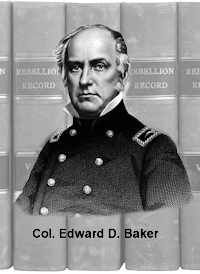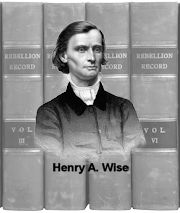March 24.—At Jacksonville, Fla., a meeting of the citizens was held, at which resolutions were passed declaring their repugnance to secession, and inviting the citizens of the State to return to their allegiance to the United States.— (Doc. 106.)
—Postmaster-general Blair issued the following notice to the Postmasters of the United States: The Secretary of War now regulates the transmission of information by telegraph, affecting the conduct of the war, in order to prevent the communication of such information to the rebels. It is also thought necessary by the Secretary to put restrictions on the publication of facts of this character, however derived, and the aid of this department is requested for this purpose. You will, therefore, notify publishers not to publish any fact which has been excluded from the telegraph, and that a disregard of this order will subject the paper to be excluded from the mails.
— At Cincinnati, Ohio, to-night, Wendell Phillips attempted to lecture. He commenced avowing himself an abolitionist and disunionist. Persons in the galleries then hissed, yelled, and threw eggs and stones at him, some hitting him. The hissing was kept up some time. Finally he made himself heard, and proceeded until something again objectionable was said, and again eggs were thrown, hitting him. He persevered, and a third time was heard and a third time stoned and egged. The crowd now moved downstairs, crying “Put him out,” “Tar and feather him,” and giving groans for the “nigger, Wendell Phillips.” They proceeded down the middle aisle toward the stage, and were met by Phillips’s friends. Here a fight ensued amidst the greatest confusion, ladies screaming and crying, jumping on chairs, and falling in all directions. During the fight Phillips was taken off the stage by his friends.—Cincinnati Commercial.
—In the United States Senate the joint resolution in favor of affording pecuniary aid for the emancipation of slaves was taken up, and opposed by Mr. Saulsbury, of Delaware. Mr. Davis, of Kentucky, offered a substitute, declaring slavery to be exclusively within the jurisdiction of the people of the several States, yet that when any State determines to emancipate its slaves the Federal Government should pay a reasonable price for the slaves and the cost of colonizing them. The subject was then laid aside, and the bill to abolish slavery in the District of Columbia was taken up. The question was taken on Mr. Davis’s amendment, to colonize the slaves, and resulted in a tie vote. The Vice-President voted in the negative, and the amendment was rejected. A debate on the merits of the bill then ensued, which was continued until the adjournment.
—An engagement occurred between the gunboats Tyler and Lexington and a masked battery in the vicinity of Eastport, Tenn. The gunboats fired fifty shots. The Tyler’s smoke-stack was struck once. The effect on the enemy’s works was not ascertained. —N. Y. Commercial, March 29.
—This morning two boats’ crews from the United States steamer Yankee landed at Shipping Point, Va., to remove the guns left by the rebels, but while so engaged a body of rebel cavalry, said to be the Dumfries cavalry, numbering one thousand five hundred men, made their appearance on the hill, and the men pulled off, after securing two guns, one a nine-inch Dahlgren and the other a long thirty-two-pounder, both smooth bore, which were found to be double-shotted. The Yankee fell out into the stream, on the appearance of the enemy, and turned her guns upon them, but they retired and kept out of range.— Washington Star, March 28.



